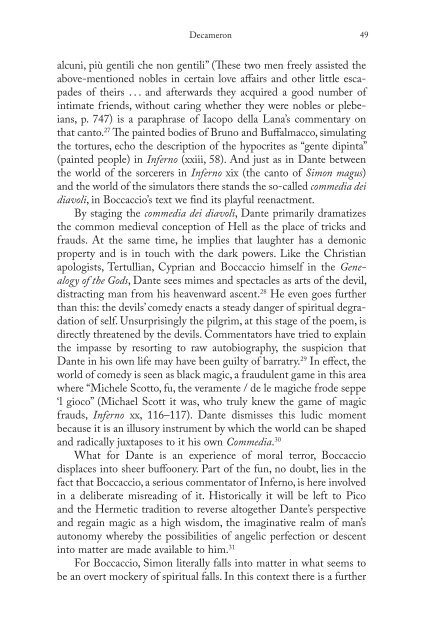Blooms Literary Themes - THE TRICKSTER.pdf - ymerleksi - home
Blooms Literary Themes - THE TRICKSTER.pdf - ymerleksi - home
Blooms Literary Themes - THE TRICKSTER.pdf - ymerleksi - home
Create successful ePaper yourself
Turn your PDF publications into a flip-book with our unique Google optimized e-Paper software.
Decameron 49<br />
alcuni, più gentili che non gentili” (Th ese two men freely assisted the<br />
above-mentioned nobles in certain love aff airs and other little escapades<br />
of theirs . . . and afterwards they acquired a good number of<br />
intimate friends, without caring whether they were nobles or plebeians,<br />
p. 747) is a paraphrase of Iacopo della Lana’s commentary on<br />
that canto. 27 Th e painted bodies of Bruno and Buff almacco, simulating<br />
the tortures, echo the description of the hypocrites as “gente dipinta”<br />
(painted people) in Inferno (xxiii, 58). And just as in Dante between<br />
the world of the sorcerers in Inferno xix (the canto of Simon magus)<br />
and the world of the simulators there stands the so-called commedia dei<br />
diavoli, in Boccaccio’s text we fi nd its playful reenactment.<br />
By staging the commedia dei diavoli, Dante primarily dramatizes<br />
the common medieval conception of Hell as the place of tricks and<br />
frauds. At the same time, he implies that laughter has a demonic<br />
property and is in touch with the dark powers. Like the Christian<br />
apologists, Tertullian, Cyprian and Boccaccio himself in the Genealogy<br />
of the Gods, Dante sees mimes and spectacles as arts of the devil,<br />
distracting man from his heavenward ascent. 28 He even goes further<br />
than this: the devils’ comedy enacts a steady danger of spiritual degradation<br />
of self. Unsurprisingly the pilgrim, at this stage of the poem, is<br />
directly threatened by the devils. Commentators have tried to explain<br />
the impasse by resorting to raw autobiography, the suspicion that<br />
Dante in his own life may have been guilty of barratry. 29 In eff ect, the<br />
world of comedy is seen as black magic, a fraudulent game in this area<br />
where “Michele Scotto, fu, the veramente / de le magiche frode seppe<br />
‘l gioco” (Michael Scott it was, who truly knew the game of magic<br />
frauds, Inferno xx, 116–117). Dante dismisses this ludic moment<br />
because it is an illusory instrument by which the world can be shaped<br />
and radically juxtaposes to it his own Commedia. 30<br />
What for Dante is an experience of moral terror, Boccaccio<br />
displaces into sheer buff oonery. Part of the fun, no doubt, lies in the<br />
fact that Boccaccio, a serious commentator of Inferno, is here involved<br />
in a deliberate misreading of it. Historically it will be left to Pico<br />
and the Hermetic tradition to reverse altogether Dante’s perspective<br />
and regain magic as a high wisdom, the imaginative realm of man’s<br />
autonomy whereby the possibilities of angelic perfection or descent<br />
into matter are made available to him. 31<br />
For Boccaccio, Simon literally falls into matter in what seems to<br />
be an overt mockery of spiritual falls. In this context there is a further

















